大学英语语法-虚拟语气
(完整版)英语虚拟语气语法归纳总结
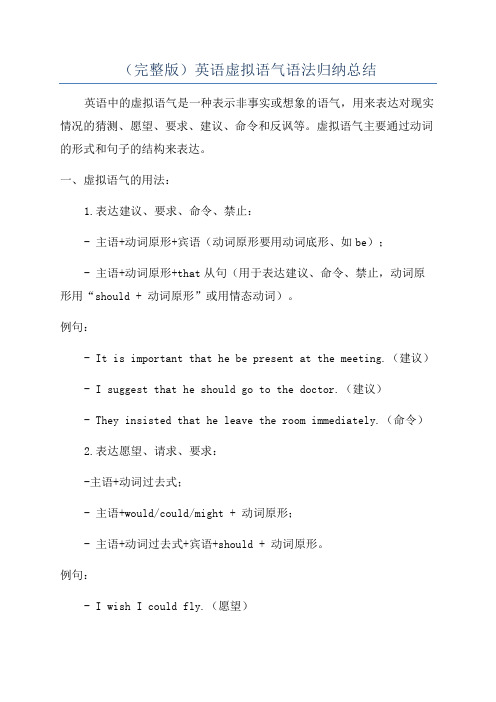
(完整版)英语虚拟语气语法归纳总结英语中的虚拟语气是一种表示非事实或想象的语气,用来表达对现实情况的猜测、愿望、要求、建议、命令和反讽等。
虚拟语气主要通过动词的形式和句子的结构来表达。
一、虚拟语气的用法:1.表达建议、要求、命令、禁止:- 主语+动词原形+宾语(动词原形要用动词底形、如be);- 主语+动词原形+that从句(用于表达建议、命令、禁止,动词原形用“should + 动词原形”或用情态动词)。
例句:- It is important that he be present at the meeting.(建议)- I suggest that he should go to the doctor.(建议)- They insisted that he leave the room immediately.(命令)2.表达愿望、请求、要求:-主语+动词过去式;- 主语+would/could/might + 动词原形;- 主语+动词过去式+宾语+should + 动词原形。
例句:- I wish I could fly.(愿望)- I would appreciate it if you could help me.(请求)3.表示虚拟条件:- If条件从句中的谓语动词用过去完成时,主句用would/should/might/could + have + 过去分词;- If条件从句中的谓语动词用过去时,主句用would/should/could + 动词原形。
例句:- If I had known his phone number, I would have called him.(虚拟条件)- If you had listened to me, we could have finished the project earlier.(虚拟条件)4.表达建议、要求、祝愿:- If only内部称述 + 主语 + 过去式。
大学英语语法精讲【重点、考点全涵盖】
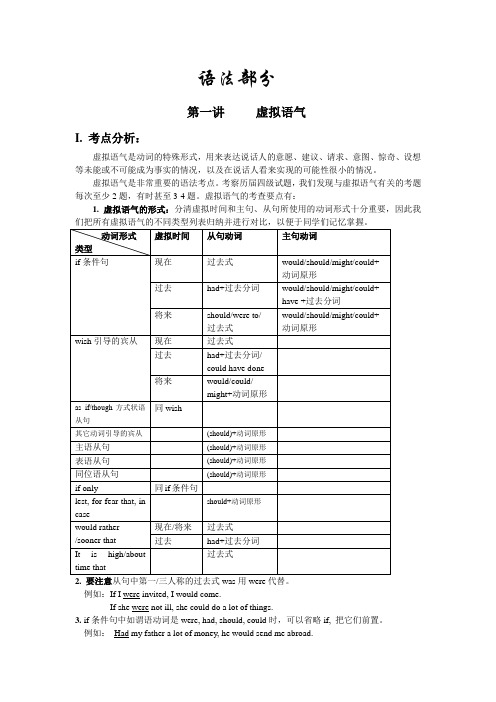
语法部分第一讲虚拟语气I. 考点分析:虚拟语气是动词的特殊形式,用来表达说话人的意愿、建议、请求、意图、惊奇、设想等未能或不可能成为事实的情况,以及在说话人看来实现的可能性很小的情况。
虚拟语气是非常重要的语法考点。
考察历届四级试题,我们发现与虚拟语气有关的考题每次至少2题,有时甚至3-4题。
虚拟语气的考查要点有:1. 虚拟语气的形式:分清虚拟时间和主句、从句所使用的动词形式十分重要,因此我2. 要注意从句中第一/三人称的过去式was用were代替。
例如:If I were invited, I would come.If she were not ill, she could do a lot of things.3. if条件句中如谓语动词是were, had, should, could时,可以省略if, 把它们前置。
例如:Had my father a lot of money, he would send me abroad.Could I do it, I would surely do it.Should the Black Death reappear, what should we do?(万一黑死病再次出现,我们该怎么办?)4. 错综时间的条件句是难点,如99年1月第60题: If I hadn’t stood under the ladder to catch you when you fell, you wouldn’t be smiling now.(从句用过去完成时,主句用现在进行时)又如:If I were you, I would have gone to the film last night.(从句虚拟现在,主句虚拟过去);If we hadn’t got everything ready by now, we should be having a terrible time tomorrow.(从句虚拟过去,主句虚拟将来);If the weather had been more favorable, the crops would be growing still better.(从句虚拟过去,主句虚拟现在)5. 虚拟句的另一难点是省略if条件句的含蓄条件句,如:I would have written the paper before, but I have been ill.(=If I had not been ill, I would have written the paper before.);A true friend would have acted differently. (=A friend, if he had been true, would have acted differently.)6. 注意介词短语without, but for, in the absence等表示虚拟条件。
大学英语语法--虚拟语气33页PPT

谢谢
11、越是没有本领的就越加自命不凡。——邓拓 12、越是无能的人,越喜欢挑剔别人的错儿。——爱尔兰 13、知人者智,自知者明。胜人者有力,自胜者强。——老子 14、意志坚强的人能把世界放在手中像泥块一样任意揉捏。——歌德 15、最具挑战性的挑战莫过于提升自我。——迈克尔·F·斯特利
大学英语语法--虚拟语气
41、实际上,我们想要ቤተ መጻሕፍቲ ባይዱ不是针对犯 罪的法 律,而 是针对 疯狂的 法律。 ——马 克·吐温 42、法律的力量应当跟随着公民,就 像影子 跟随着 身体一 样。— —贝卡 利亚 43、法律和制度必须跟上人类思想进 步。— —杰弗 逊 44、人类受制于法律,法律受制于情 理。— —托·富 勒
本科英语语法—虚拟
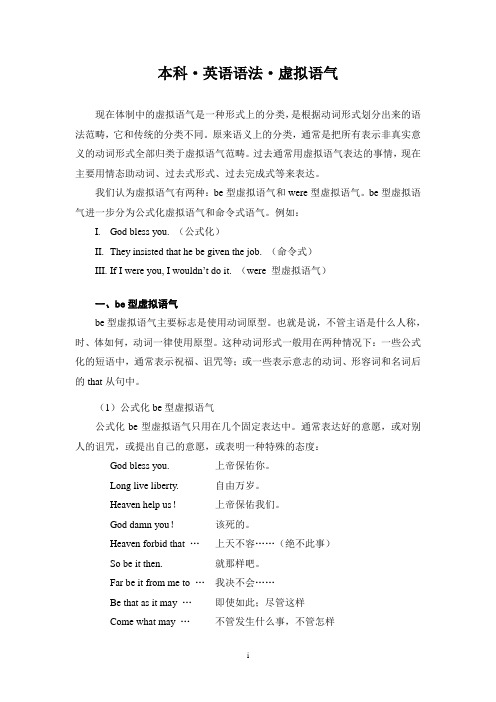
本科·英语语法·虚拟语气现在体制中的虚拟语气是一种形式上的分类,是根据动词形式划分出来的语法范畴,它和传统的分类不同。
原来语义上的分类,通常是把所有表示非真实意义的动词形式全部归类于虚拟语气范畴。
过去通常用虚拟语气表达的事情,现在主要用情态助动词、过去式形式、过去完成式等来表达。
我们认为虚拟语气有两种:be型虚拟语气和were型虚拟语气。
be型虚拟语气进一步分为公式化虚拟语气和命令式语气。
例如:I. God bless you. (公式化)II. They insisted that he be given the job. (命令式)III. If I were you, I wouldn’t do it. (were 型虚拟语气)一、be型虚拟语气be型虚拟语气主要标志是使用动词原型。
也就是说,不管主语是什么人称,时、体如何,动词一律使用原型。
这种动词形式一般用在两种情况下:一些公式化的短语中,通常表示祝福、诅咒等;或一些表示意志的动词、形容词和名词后的that从句中。
(1)公式化be型虚拟语气公式化be型虚拟语气只用在几个固定表达中。
通常表达好的意愿,或对别人的诅咒,或提出自己的意愿,或表明一种特殊的态度:God bless you. 上帝保佑你。
Long live liberty. 自由万岁。
Heaven help us!上帝保佑我们。
God damn you!该死的。
Heaven forbid that …上天不容……(绝不此事)So be it then. 就那样吧。
Far be it from me to …我决不会……Be that as it may …即使如此;尽管这样Come what may …不管发生什么事,不管怎样Suffice it to say that …只要说……就够了。
这些表达很少,而且在当代英语中使用较少。
它们多是意志的一种古老的表达法,其实可用其它多种方法来表达,如用let, may等。
大学英语语法虚拟语气
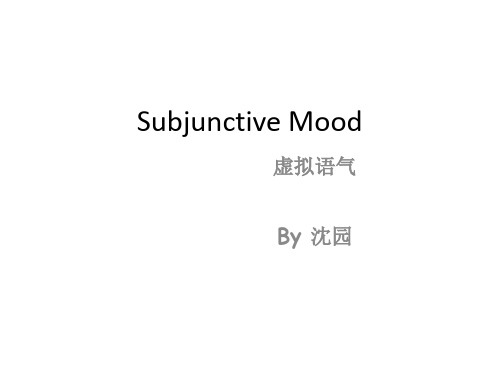
• B。Should you be fired是由If you should be fired变来的,又如:Should you require (=If you should require) anything give me a ring.如 果需要什么,可以给我打电话。
4. 连词if的省略。 在书面语中,条件从句可以不用连词if, 而将谓语中 的过去式were, had或should等移至主语之前。如: Had I time, I would come. Were you in my position, you would do the same. Should they attack us, we’ll wipe them out completely.
“Mary looks hot and dry” “So _________ you if you had a high fever.” A. do B. are C. will D. would
D。那是因为其后的 if条件状语从句的谓语用 的是虚拟语气(许多同学会忽略此信息), 所以主句要用 would而不用 will。
Yesterday, Jane walked away from the discussion. Otherwise, she ________ something she would regret later. A. had said B. said C. might say D. might have said
—Don’t you think it necessary that he ________ to Miami but to New York? — I agree, but the problem is ________ he has refused to. A. will not be sent; that B. not be sent; that C. should not be sent; what D. should not send; what
英语语法——虚拟语气
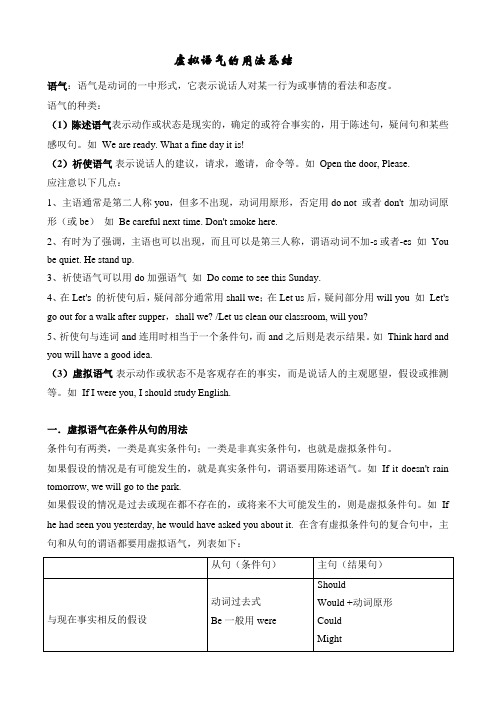
虚拟语气的用法总结语气:语气是动词的一中形式,它表示说话人对某一行为或事情的看法和态度。
语气的种类:(1)陈述语气表示动作或状态是现实的,确定的或符合事实的,用于陈述句,疑问句和某些感叹句。
如We are ready. What a fine day it is!(2)祈使语气表示说话人的建议,请求,邀请,命令等。
如Open the door, Please.应注意以下几点:1、主语通常是第二人称you,但多不出现,动词用原形,否定用do not 或者don't 加动词原形(或be)如Be careful next time. Don't smoke here.2、有时为了强调,主语也可以出现,而且可以是第三人称,谓语动词不加-s或者-es 如You be quiet. He stand up.3、祈使语气可以用do加强语气如Do come to see this Sunday.4、在Let's 的祈使句后,疑问部分通常用shall we;在Let us后,疑问部分用will you 如Let's go out for a walk after supper,shall we? /Let us clean our classroom, will you?5、祈使句与连词and连用时相当于一个条件句,而and之后则是表示结果。
如Think hard and you will have a good idea.(3)虚拟语气表示动作或状态不是客观存在的事实,而是说话人的主观愿望,假设或推测等。
如If I were you, I should study English.一.虚拟语气在条件从句的用法条件句有两类,一类是真实条件句;一类是非真实条件句,也就是虚拟条件句。
如果假设的情况是有可能发生的,就是真实条件句,谓语要用陈述语气。
如If it doesn't rain tomorrow, we will go to the park.如果假设的情况是过去或现在都不存在的,或将来不大可能发生的,则是虚拟条件句。
英语《虚拟语气》语法知识总结归纳
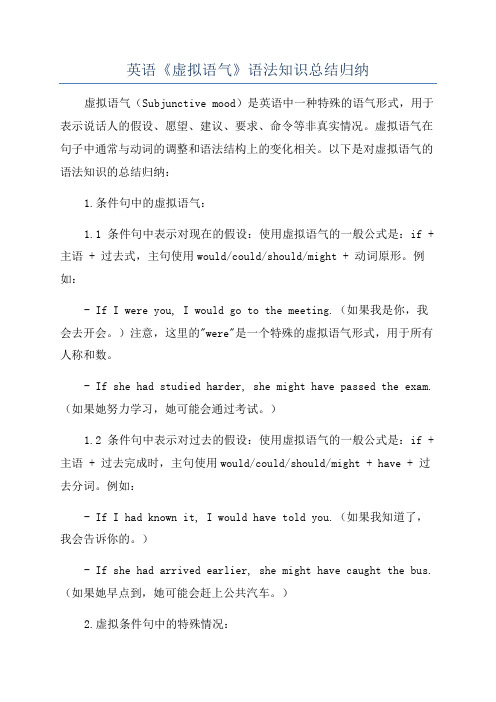
英语《虚拟语气》语法知识总结归纳虚拟语气(Subjunctive mood)是英语中一种特殊的语气形式,用于表示说话人的假设、愿望、建议、要求、命令等非真实情况。
虚拟语气在句子中通常与动词的调整和语法结构上的变化相关。
以下是对虚拟语气的语法知识的总结归纳:1.条件句中的虚拟语气:1.1 条件句中表示对现在的假设:使用虚拟语气的一般公式是:if + 主语 + 过去式,主句使用would/could/should/might + 动词原形。
例如:- If I were you, I would go to the meeting.(如果我是你,我会去开会。
)注意,这里的"were"是一个特殊的虚拟语气形式,用于所有人称和数。
- If she had studied harder, she might have passed the exam.(如果她努力学习,她可能会通过考试。
)1.2 条件句中表示对过去的假设:使用虚拟语气的一般公式是:if + 主语 + 过去完成时,主句使用would/could/should/might + have + 过去分词。
例如:- If I had known it, I would have told you.(如果我知道了,我会告诉你的。
)- If she had arrived earlier, she might have caught the bus.(如果她早点到,她可能会赶上公共汽车。
)2.虚拟条件句中的特殊情况:2.1 在虚拟条件句中表示命令、建议时,主句中的动词可以使用动词原形(而不是would/could/should/might + 动词原形)。
例如:- If you have any questions, please let me know.(如果你有任何问题,请告诉我。
)- If I were you, I would take a break.(如果我是你,我会休息一下。
大学英语语法疑难点解析
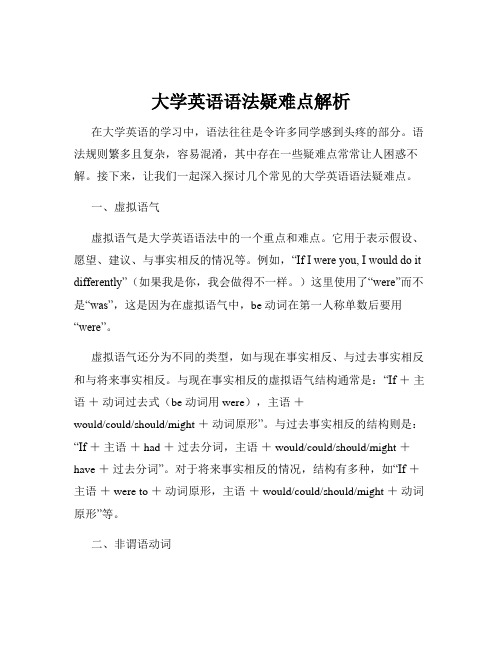
大学英语语法疑难点解析在大学英语的学习中,语法往往是令许多同学感到头疼的部分。
语法规则繁多且复杂,容易混淆,其中存在一些疑难点常常让人困惑不解。
接下来,让我们一起深入探讨几个常见的大学英语语法疑难点。
一、虚拟语气虚拟语气是大学英语语法中的一个重点和难点。
它用于表示假设、愿望、建议、与事实相反的情况等。
例如,“If I were you, I would do it differently”(如果我是你,我会做得不一样。
)这里使用了“were”而不是“was”,这是因为在虚拟语气中,be 动词在第一人称单数后要用“were”。
虚拟语气还分为不同的类型,如与现在事实相反、与过去事实相反和与将来事实相反。
与现在事实相反的虚拟语气结构通常是:“If +主语+动词过去式(be 动词用 were),主语+would/could/should/might +动词原形”。
与过去事实相反的结构则是:“If +主语+ had +过去分词,主语+ would/could/should/might +have +过去分词”。
对于将来事实相反的情况,结构有多种,如“If +主语+ were to +动词原形,主语+ would/could/should/might +动词原形”等。
二、非谓语动词非谓语动词包括动词不定式(to do)、动名词(doing)和分词(现在分词doing 和过去分词done)。
这也是大学英语语法中的一个难点。
动词不定式常用来表示目的、将来的动作等。
例如,“To learn English well, we need to practice more”(为了学好英语,我们需要更多练习。
)动名词则具有名词的特征,在句中可以作主语、宾语等。
比如,“Swimming is good for health”(游泳对健康有益。
)分词在句中可以作定语、状语等。
现在分词表示主动和正在进行的动作,过去分词表示被动和完成的动作。
- 1、下载文档前请自行甄别文档内容的完整性,平台不提供额外的编辑、内容补充、找答案等附加服务。
- 2、"仅部分预览"的文档,不可在线预览部分如存在完整性等问题,可反馈申请退款(可完整预览的文档不适用该条件!)。
- 3、如文档侵犯您的权益,请联系客服反馈,我们会尽快为您处理(人工客服工作时间:9:00-18:30)。
虚拟语气1. I wish (that可省略,下同)I knew the answer to the question.我希望知道这个答案。
(事实上是不知道)2. He wishes he hadn't lost the chance.他真希望没有失去机会。
(其实已失去)3. You wished she would arrive the next day.(would + arrive)你希望她第二天会到。
(事实上她还没到)Subjunctive Mood作为专门表达假设意义和其他非事实意义的动词形式,仅是古英语遗留下来的残余。
它仅有两个形式,即be型虚拟式和were型虚拟式。
Be型虚拟]-----be型虚拟式是以动词原形表示的,不管主语是什么人称,动词一律用原形,如动词为被动态,则助动词be也用原形。
其主要用法如下:1)用于表命令、决定、建议、坚持等词语之后的that分句中这一用法又分三种情况:a)用在decide,decree,demand,insist,move,order,prefer,propose,recommend,request,require, suggest,vote等动词之后的that分句中.(宾语从句)在expect, believe, think, suspect等动词的否定或疑问形式后的宾语从句中,我们经常用“should+动词原形(或完成形式)”,表示惊奇,怀疑,不满等。
He ordered that all the books be sent at once.He ordered that all the books be sent at once.we propose that somebody neutral take the chair.She insisted that she go to the south for her holiday.b)用在advisable,appropriate,desirable,essential,fitting,imperative,important,impossible,nece ssary,obligatory,proper等形容词之后的that分句中。
(主语从句)It is essential that all the facts be examined first.It was appropriate that thisi tax be abolished.I thousht it advisable that an armed guard stand in readiness.c)用在decision,decree,demand,instruction,order,requirement,resolution等名词之后的that分句中。
The board has given instructions that the agent fly to Boston.We were faced with the demand that this tax be abolished.Their decision was that the school remain closed.在这一用法中be型虚拟式能与“should+不定式”交替使用,也能与to-不定式交替使用。
He ordered that the books be sent at once .= He ordered that the books should be sent at onc.= He ordered that the books to be sent at once.2)用于由if,though等引导的分句中.be型虚拟式能用于由if,though,whatever,lest,so long as lest, for fear that, in caseso that, in order that 等引导的分句中表推测、让步、防备等含义。
If he be found guilty,Jonh shall have the right of appeal.Though everyone desert you, I will not.Quitly we sat on the river bank lest the fish swim away.上述用法现在只限于书面体,在非正式语体中通常用动词陈述式或者用should/may+不定式。
Whatever hisdefense maybe,we can’t tolerate this disloyalty.3)用于某些公式化语句中be型虚拟式用于某些公式化语句中可表祝愿、诅咒、禁止等意义。
Long live the People's Republic of China!God bless you!God damn you!So be it.(但愿如此吧)Were型虚拟]-----Were 型虚拟语气只有一种形式,即无论主语是什么人称,动词一律用were,如I were,you were ,如果动词为进行体或被动态,其助动词也一律用were,如I were going,you were going,I were sent ,you were sent1)用于某些状语从句如if , if only, as if , as though, though引导的条件状语和让步状语从句,表示非真是的条件或让步。
If I were you, I should wait till next week.If only I were not so nervous.He behaves as though he were better than us.2)用于某些名词性从句如wish, would rather, suppose,imagine 之后的that—分句中,表示一种臆想的(通常是不可能发生的事)I wish it were spring all the year round.I’d rather I were not at the site of the accident.Suppose the earth were flat.上述were型虚拟式在第一三人称单数主语之后可为was 所取代。
If it was to rain,the game would be put off.If only I was not so nervous.但是,在if I were you 这一分句中,通常不用was 。
另外在某些倒装句结构中只用were,不用was。
Were I to do it =(if I were to do it),I should rely on you.还有在as it were(作so to speak 解,即“宛如””好比”)结构中也只用were,不用was He is my best friend,my second felf ,as it were.假设意义表示法综述1)用动词的过去时形式表示假设意义a) It is (high ,about )time thatIt is time that we went (或should go) to bed.It’s about time that we put an end to this controversy.b) I would rather / would sooner / would as soon / would just as soon (that) you / he/ theyI’d sooner she left the heavy end of t he work to someone else.c) if onlyIf only I knew what you wanted.If only he had arrived in time,he would not have been punished.d) as if, as thoughIt seems as if it were spring.现在好像是春天似的。
She appeared as if she had known nothing about it.她看上去对此一无所知。
as if, as though结构中如果不表示假设意义,就不必用过去时时态。
It looks as if it is going to rain.e) I wish(that)I wish I remembered the address.I wish 与I hope都表示“希望”但I hope 并不表示假设意义其后很少用过去时时态。
I hope you are ready.用情态助动词过去时时态表示假设意义最常见于条件句和含蓄条件句a)用于条件句(若if 省略要用到装)If she were younger, she would do it.去If:Were she younger, she would do it. (把动词were移到主语she的前面)If he had tried it, he could have done it.去If:Had he tried it, he could have done it.(把had移到主语he的前面)Were I a bird, I could fly freely.如果虚拟条件句中有were, had或should时,把它们放在if的位置上;但是如果条件句中没有were, had或should不能用倒装。
如:Should it rain tomorrow, what should we do?要是明天下雨的话,我们怎么办呢?Were I you, I would have asked him for some advice.要是我是你的话,我就向他请教了。
在“开放式条件句”(open conditional clause)和让步状语从句中若should是被省略了的。
在这种情况下,如果if省略,动词be与主语的位置要倒装。
如:If any person be guilty of a crime, the court shall have the right to appeal. (任何人犯罪,法院有权起诉。
)Be any person guilty of a crime, the court shall have the right to appeal.Whether she be right or wrong, she will have my unanswering support. (不管她对与错,我都会支持她)Be she right or wrong, she will have my unanswering support.注意:有时虚拟条件句并没来if 从句表示出来,而是用介词短语(otherwise, or, without, but for)、上下文或其它方式来表示。
